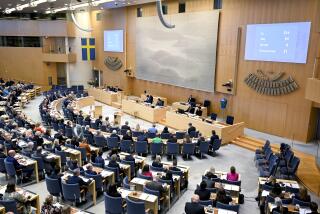Sweden Ends Designation of Lutheranism as Official Religion
- Share via
BERLIN — Reflecting the ethnic diversity and secular focus of modern Sweden, the Stockholm government is severing its official relationship with the Church of Sweden today after nearly 500 years as the guardian and guarantor of the Lutheran faith.
It is a move heralded by most politicians and public figures as a long overdue separation of church and state that will put all religions on an equal legal footing and have little tangible influence on the economic health of the country’s 3,300 Church of Sweden congregations.
But as church membership and attendance flag in Sweden, as they do elsewhere in Europe, some religious leaders fear that the loss of official sanction from king and country will send a message to Swedes that spiritual life is unimportant.
“I think the connection between state and church has given religion a kind of legitimate status, and by breaking that connection it unconsciously gives people the impression that religion as a way of life is not worth doing anything about,” said Edward Harris, a Lutheran pastor in central Stockholm. “I think this will prove to be catastrophic for religion in Sweden.”
With nearly 85% of Sweden’s 8.8 million citizens registered as members of the state church, the spiritual health of the country would seem respectably strong. But church officials concede that most Swedes attend services only a couple of times a year, and the designation of an official religion creates a sense of exclusion for the growing number of Catholics, Orthodox Christians and Muslims.
Membership in the Church of Sweden is down from 89% four years ago, when the government ceased registering every child born to a church member as an automatic addition to the congregation. Church membership now begins with baptism, and the number of newborns so consecrated is only 73%.
Until now, the Swedish ministry of culture has appointed the archbishop and all bishops and their assistants, as well as 13 Lutheran foundation directors. These appointments now will be made by the church itself, said Carl-Einar Nordling, the ministry of culture’s director for religious affairs.
“This separation is an old question that has been on the political agenda for more than 100 years,” said Nordling. “The basic answer as to why we are doing it now is that Swedish society has changed during these last 100 to 150 years. We are now a more multicultural, multiethnic and multireligious society and church is no longer considered a part of public life--it’s a private matter.”
As in Germany, the Swedish government has long collected a “church tax” from members to finance the clergy and maintain church property. All registered faiths now may hire the government’s collection services on a contractual basis, but the collections will be determined and dispersed by the congregations.
The Swedish government also will continue paying for upkeep of the more than 3,000 old churches in the country that are deemed part of the national cultural heritage, said Nordling.
Religious leaders from other churches hail the New Year’s changes as creating a more equitable relationship between the state and its people of faith.
“This has been supported by all churches because it reflects a new understanding of equality,” said Per-Axel Sahlberg, a Methodist minister in the western city of Gothenburg representing a denomination that has only 4,000 members throughout Sweden. He believes other faiths will have more opportunity to grow without the Church of Sweden designated as the official house of worship for the country and the salaries of Lutheran ministers paid out of state coffers.
Nordling described the separation process approved by the Swedish parliament five years ago as a kind of privatization of the church: “Now each church has a fair chance to compete on the free marketplace of religion.”
More to Read
Sign up for Essential California
The most important California stories and recommendations in your inbox every morning.
You may occasionally receive promotional content from the Los Angeles Times.














